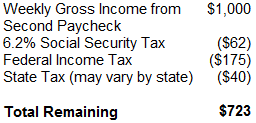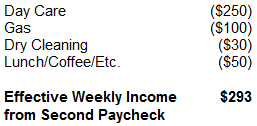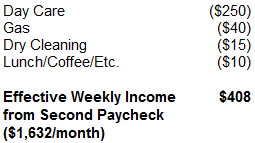The inclination in most homes is to push both spouses into the workforce to generate as much income as possible. That's especially true for married couples with children.
This impulse stems from a real or perceived necessity, combined with an American work ethos that puts an emphasis on keeping busy. But there's a rub: That extra paycheck isn't always worth it.
Consider a hypothetical example of dual-career parents. Using broad numbers, each parent brings in $52,000 for an approximate total-family income of $104,000 a year, which comes to $1,000 a week each. With their fixed overhead -- mortgage, two cars, daycare, cable TV, Netflix, cell phones, Sirius radio, Internet connection, gym membership, etc. -- they couldn't possibly imagine giving up one of the paychecks.
So they both keep their demanding jobs, and as a consequence, live hectic lives of commuting and carpooling. They're stressed out, but they figure it's worth it.
But is it? Let's examine how much additional income they really get to keep from that second paycheck (using 2011 tax rates):

The 'bite' doesn't end with Uncle Sam. Our golden couple must factor in other expenses associated with the second paycheck. Here are hypothetical examples computed on a weekly basis:

Not a whole lot of money, is it? But keep in mind that $293 adds up to $1,172 a month. This is why many couples opt for two incomes: The extra money helps pay for vacations, holiday gifts, debt payments, retirement funds -- you name it. The trick is to stretch that second paycheck a lot further. Consider taking your lunch to work and driving a car that gets better gas mileage. Reduce your use of extras such as dry cleaning, eating out, entertainment and gym memberships.
These small changes can make a big difference in the amount of money you have left over at the end of the month.

Of course, results will vary according to your tax bracket and situation. Refer to the following chart to calculate your tax rate based on income. [Remember, the U.S. has a progressive tax system that taxes you in steps. For more information on how this system works, visit our progressive tax definition.]

A second paycheck can also make a mortgage more affordable, and allow you to claim the mortgage interest deduction -- a hefty advantage to your finances. Despite recent calamities in the housing market, a home still makes a solid long-term investment.
You can also claim the child tax credit and get a $500 tax credit per child on your tax return, as long as your children are under age 17 at the end of the tax year. Unfortunately, due to changes enacted by Congress in 2010, the child tax credit in 2011 will return to $500 from the amount of $1,000 in place in 2010. But it's still a sizable number.
By the way, the difference between a tax credit and a tax deduction often confuses people. A credit is superior to a deduction because it lowers the income used to calculate your taxes. The child tax credit actually removes those dollars directly from your tax bill. Moreover, the credit does not preclude exemptions for kids -- it's in addition to your exemptions.
When evaluating your household income and expenses, be sure to take 'quality of life' into the equation. A lot of couples enjoy their careers and derive satisfaction from their accomplishments outside of the home. On the other hand, staying home to take care of the kids is a noble occupation -- and it just might make financial sense according to your particular situation.



